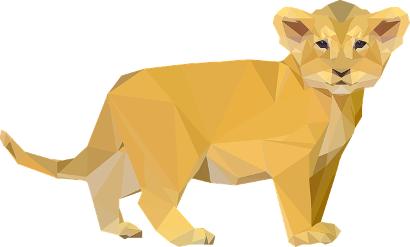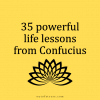
Awareness of your true self is the difference between feeling empowered or feeling like a victim.
Here are 12 short stories that explain the importance of becoming aware of our true self.
1. The Man and His Horse

A monk slowly walks along a road when he hears the sound of a galloping horse. He turns around to see a man riding a horse moving swiftly towards his direction. When the man reaches closer, the monk asks, “Where are you going?”. To which the man replies, “I don’t know, ask the horse” and rides away.
Moral of the story:
The horse in the story represents your subconscious mind. The subconscious mind runs on past conditioning. It is nothing but a computer program. If you are lost in the program, the program controls you and leads you wherever it feels like.
Instead, when you become self aware, you start to become aware of your programs and start looking at them objectively. Once you become aware of the program, you start to control the program and not the other way round.
2. The Lion and the Sheep

There was once a pregnant lion that was on its last legs. She dies soon after giving birth. The newborn not knowing what to do, makes its way into a nearby field and mingles with a herd of sheep. The mother sheep sees the cub and decides to raise it as its own.
And so the lion cub grows up along with the other sheep and starts thinking and acting just like a sheep. It would bleat like a sheep and even eat grass!
But it was never truly happy. For one, it always felt that there was something missing. And secondly, the other sheep would constantly ridicule it for being so different.
They would say, “You are so ugly and your voice sounds so weird. Why can’t you bleat properly like the rest of us? You are a disgrace to the sheep community!”
The lion would just stand there and take in all these remarks feeling extremely sad. It felt it had let down the sheep community by being so different and that it was a waste of space.
One day, an older lion from a far off jungle sees the herd of sheep and decides to attack it. While attacking, it sees the young lion running away along with the other sheep.
Curious as to what was happening, the older lion decides to stop chasing the sheep and pursues the younger lion instead. It pounces on the lion and growls asking it why it is running away with the sheep?
The younger lion shakes in fear and says, “please don’t eat me, I am just a young sheep. Please let me go!”.
Upon hearing this, the older lion growls, “That’s nonsense! You are not a sheep, you are a lion, just like me!”.
The younger lion simply repeats, “I know I am a sheep, please let me go”.
At this point the older lion gets an idea. It drags the younger lion to a river nearby and asks it to look at its reflection. Upon looking at the reflection, the lion much to its own astonishment realizes who it really was; it was not a sheep, it was a mighty lion!
The young lion feels so thrilled that it lets out a mighty roar. The roar echoes from all corners of the jungle and frightens the living daylights out of all the sheep that were hiding behind the bushes to see what was happening. They all flee away.
No longer will the sheep be able to make fun of the lion or even stand close to it for the lion had found its true nature and its true herd.
Moral of the story:
The older lion in the story is a metaphor for ‘self awareness’ and looking at the reflection in the water is a metaphor for ‘self reflection’.
When the younger lion becomes aware of its limiting beliefs through self reflection it realizes its true nature. It is no longer influenced by its surroundings and develops a bigger vision in alignment with its nature.
Just like the younger lion in this story, you might have been brought up in surroundings that were negative and hence accumulated many negative beliefs about yourself. Bad parenting, bad teachers, bad peers, media, government and society can all have these negative influences on us when we are young.
As an adult, it is easy to lose yourself in negative thoughts and to start feeling like a victim by blaming the past. But that will only keep you stuck in the current reality. To change your reality and find your tribe, you need to start working on your inner self and focus all your energy towards becoming self aware.
The older lion in this story is not an external entity. It is an internal entity. It lives right inside you. The older lion is your true self, your awareness. Allow your awareness to shine light onto all your limiting beliefs and find who you truly are.
3. The Teacup

There was once a well-educated, highly successful man who went to visit a Zen master to ask for solutions to his problems. As the Zen master and the man conversed, the man would frequently interrupt the Zen master to interject his own beliefs, not allowing the Zen master to finish many sentences.
Finally, the Zen master stopped talking and offered the man a cup of tea. When the Zen master poured the tea, he kept pouring after the cup was full, causing it to overflow.
“Stop pouring,” the man said, “The cup is full.”
The Zen master stopped and said, “Similarly, you are too full of your own opinions. You want my help, but you have no room in your own cup to receive my words.”
Moral of the story:
This Zen story is a reminder that your beliefs are not you. When you unconsciously hold on to your beliefs, you become rigid and closed-mind to learn and expand your consciousness. The path to self realization is to stay conscious of your beliefs and always be open to learning.
4. Elephant and the Pig

An elephant was walking toward its herd after taking bath in a nearby river. On its way the elephant sees a pig walking towards it. The pig as usual was coming after a relaxing dip in muddy waters. It was covered in mud.
Upon approaching closer, the pig sees the elephant moving out of its way allowing the pig to pass. While walking past, the pig makes fun of the elephant accusing the elephant of being afraid of it.
It also tells this to other pigs standing nearby and they all laugh at the elephant. Upon seeing this, some elephants from the herd ask their friend in amazement, “Were you really afraid of that pig?”
To which the elephant replies, “No. I could have pushed the pig aside if I wanted to, but the pig was muddy and the mud would have splashed on me too. I wanted to avoid that, hence I stepped aside.”
Moral of the story:
The mud covered pig in the story is a metaphor for negative energy. When you interact with negative energy, you allow your space to be infiltrated by that energy too. The evolved way is to let go of such petty distractions and focus all your energy on things that matter.
Even though the elephant must have felt anger, it did not allow the anger to evoke an automatic emotional reaction. Instead it responded after careful examination of the situation and that response was to let the pig go.
Once you are in a higher state of vibration (more self aware), you are no longer distracted by petty things. You no longer automatically react to all external stimuli. You have a deeper understanding of what serves you and what does not.
Spending your precious energy arguing/fighting with someone who is egoistically motivated is never going to serve you. It just leads to a, ‘who is better’ battle where no one wins. You end up giving your energy to an energy vampire who craves attention and drama.
Instead, you are better off diverting all your attention on things that matter and simply discard things that are of a lower significance.
4. Monkey and the Fish

The fish loved the river. It felt blissful swimming around in its clear blue waters. One day while swimming closer to the river banks it hears a voice say, “hey, fish, how is the water?”.
The fish raises its head above the water and sees a monkey seated on a branch of a tree.
The fish replies, “The water is nice and warm, thank you”.
The monkey feels jealous of the fish and wants to put it down. It says, “why don’t you come out of the water and climb this tree. The view from here is amazing!”
The fish feeling a little sad, replies, “I don’t know how to climb a tree and I cannot survive without water”.
Hearing this the monkey makes fun of the fish saying, “you are totally worthless if you cannot climb a tree!”
The fish starts thinking about this remark day and night and becomes extremely depressed, “yes, the monkey is right”, it would think, “I cannot even climb a tree, I must be worthless.”
A sea-horse sees the fish feeling all depressed and asks it what the reason was. Upon knowing the reason, the sea-horse laughs and says, “If the monkey thinks you are worthless for not being able to climb the tree, then the monkey is worthless too cause it cannot swim or live under water.”
Upon hearing this the fish suddenly realized how gifted it was; that it had the ability to survive under water and swim freely which the monkey never could!
The fish feels thankful to nature for giving it such an amazing ability.
Moral of the story:
This story takes from Einstein’s quote, “Everybody is a genius. But if you judge a fish by its ability to climb a tree, it will live its whole life believing that it is stupid”.
Take a look at our education system that judges everyone based on the same criterion. Coming out of such a system, it’s easy for many of us to start believing that we are actually less gifted than others. But the reality is far from it.
The fish in the story attains self realization. It realizes what its true power was thanks to its friend. In a similar way, the only way to realize your true potential is to become self aware. The more awareness you bring into your life, the more you realize your true potential.
6. The Afterlife

An Emperor visited a Zen master to ask about the afterlife. “When an enlightened man dies, what happens to his soul?” Asked the emperor.
All the Zen master had to say was: “I have no idea.”
“How could you not know?” Demanded the Emperor. “You’re a Zen master!”
“But I am not a dead Zen master!” He proclaimed.
Moral of the story:
No one knows the absolute truth of life. Every idea presented is a mere theory based on one’s own subjective interpretations. In this respect, it is important to realize the limitations of the human mind as you continue in your quest for knowledge.
7. Anger Management
A young man approached a Zen master pleading for help with his anger problem. “I have a quick temper, and it’s damaging my relationships,” the young man said.
“I’d love to help,” said the Zen master. “Can you demonstrate your quick temper to me?”
“Not right now. It happens suddenly,” the young man replied.
“Then what is the problem?” asked the Zen master. “If it were a part of your true nature, it would be present all the time. Something that comes and goes is not a part of you, and you shouldn’t concern yourself with it.”
The man nodded in understanding and went on his way. Soon afterwards, he was able to become aware of his temper, thus controlling it and repairing his damaged relationships.
Moral of the story:
Your emotions are not you but they can gain control over you if you do not reflect on them. The only way to tame a subconscious reaction is to bring the light of consciousness to it. Once you become conscious of a belief, action or emotion, it no longer wields control over you.
8. Glorious Moon

There was an old Zen master who lived a simple life, in a hut in the mountains. One night, a thief broke into the hut while the Zen master was away. However, the Zen master owned very few possessions; thus, the thief found nothing to steal.
At that moment, the Zen master returned home. Upon seeing the thief in his house, he said, “You’ve walked so far to get here. I’d hate for you to return home with nothing.” So, the Zen master gave all of his clothes to the man.
The thief was shocked, but he confusedly took the clothes and left.
Afterward, the now-naked Zen master sat outside and gazed at the moon. “Poor man,” he said to himself. “I wish I could give him this glorious moon.”
Moral of the story:
A person who has a lower level of consciousness is always preoccupied with material possessions. But once your consciousness expands, you start to think beyond the material. You become richer from within as you start to realize all the magical things that surround you and the power in the mere fact that you exist.
9. Perfect Silence
Four students who practiced meditation together decided to observe a vow of silence for seven days. For the first day, all was perfectly silent. But then, when night fell, one of the students couldn’t help but notice that the lamps were becoming dim.
Without thinking, he blurted to an assistant, “Please fuel the lamps!”
His friend said, “Be quiet, you’re breaking your vow!”
Another student shouted, “Why are you fools talking?”
Finally, the fourth student commented, “I’m the only one who didn’t break my vow!”
Moral of the story:
With the intention of correcting the other, all four students broke the vow within the first day. The lesson here is to remember, that instead of focusing your energy on criticizing or judging the other person, the prudent thing to do is look at your own self and engage in self reflection. Self reflection is the way to self realization.
10. Differing Perceptions

A young man and his friend were walking along the river bank, when they stopped to gaze at some fish.
“They’re having so much fun,” exclaimed the young man.
“How would you know that? You’re not a fish.” His friend shot back.
“But you’re not a fish either,” argued the young man. “Therefore, how would you know that I don’t know that they’re having fun?”
Remember that other people’s perceptions matter just as much as yours!
Moral of the story:
There is no absolute truth. Everything is a matter of perspective. The same things appear completely different depending on how you perceive them.
11. Impermanence
A wise old Zen teacher once visited the king’s palace late at night. The guards recognized the trusted teacher, and did not stop him at the door.
Upon approaching the king’s throne, the king greeted him. “How can I help you?” Asked the king.
“I need a place to sleep. May I have a room at this inn for a night?” The teacher responded.
“This is no inn!” Laughed the king. “This is my palace!”
“Is it your palace? If so, who lived here before you were born?” The teacher asked.
“My father lived here; he’s dead now.”
“And who lived here before your father was born?”
“My grandfather, of course, who is dead as well.”
“Well,” the Zen teacher concluded, “It sounds to me as if this is a house where people stay for some time, and then go away. Are you sure that this is not an inn?”
Moral of the story:
Your possessions are a mere illusion. Realizing this can be truly freeing. This does not mean that you renounce everything and become a monk, it just means that you realize deep inside about this nature of impermanence.
12. Cause and Effect
There was once an old farmer who was tending to his fields one day, when his horse broke the gate and bolted away. His neighbors, upon hearing the news that the farmer lost his horse, offered their sympathy. “That’s terrible luck,” they said.
“We’ll see,” was all the farmer replied.
The next day, the farmer and his neighbors were stunned to see the horse return, along with three other wild horses. “What awesome luck!” Said the farmer’s neighbors.
Again, all the farmer had to say was, “We’ll see”.
The following day, the farmer’s son tried riding one of the wild horses. He was unfortunately thrown from the horse, and broke his leg. “Your poor son,” said the farmer’s neighbors. “This is terrible.”
Once more, what did the farmer say? “We’ll see.”
Finally, the next day, visitors appeared in the village: they were military generals drafting young men into the army. Due to the young man’s broken leg, the farmer’s son was not drafted. “How lucky you are!” Said the farmer’s neighbors to the farmer, once again.
“We’ll see,” the farmer remarked.
Moral of the story:
The fact of the matter is that your mind cannot predict the future. We can make assumptions but that does not mean that your assumptions will always be true. Therefore, the prudent thing is to live in the now, have patience and let things unfold at their own pace.







